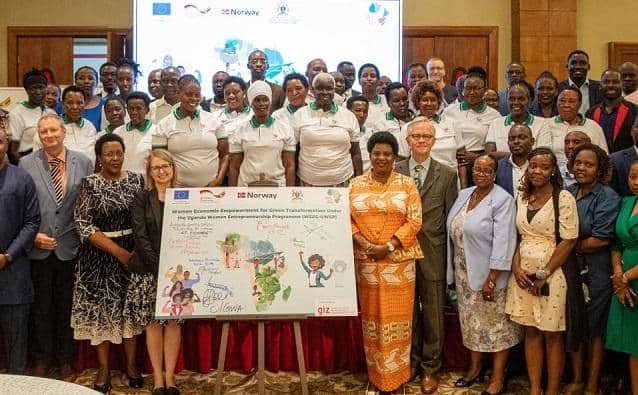
More than 600 women-led groups across Uganda are set to benefit from a new initiative designed to empower rural entrepreneurs while advancing the country’s transition to a green economy.
The Women’s Economic Empowerment for the Green Transformation Project (WEEG), rolled out under the Uganda Women Entrepreneurship Program (UWEP), will strengthen women-led businesses in sustainable sectors such as renewable energy, agro-processing, eco-tourism, and waste management. Officials say the project will directly benefit over 5,000 women, with support tailored for enterprises already engaged in environmentally friendly practices.
At the launch, Gender, Labor and Social Development Minister Betty Amongi praised rural women for transforming everyday waste and agricultural products into marketable goods, citing examples such as banana wine, shoes made from old tires, herbal products, and charcoal briquettes produced from rubbish.
“Every little support you give to rural women in terms of capital, they utilize it much more than us in offices,” Amongi said. “If you empower a woman, the benefits stay at the household level and support the whole family. That is smart economics.”
She stressed that WEEG builds on already proven innovations instead of “reinventing the wheel,” noting that beneficiaries will receive technical training, certification support, and improved market access.
The project is part of the broader Women’s Employment Promotion for the Green Transformation of Africa (WE4D) program, funded by Germany in partnership with the EU and Norway, and implemented by GIZ. German Ambassador to Uganda Matthias Schauer said the program would not only create jobs but also help tackle environmental challenges.
“By increasing the competitiveness of women’s groups in the green sector, we create employment, raise incomes, and protect the environment at the same time,” Schauer noted.
One of the biggest hurdles for women entrepreneurs is product certification. Without approval from the Uganda National Bureau of Standards (UNBS), many cannot sell in supermarkets or export. WEEG will provide branding, certification, and quality assurance support to open new markets.
Diana Babirye, secretary of the Bakyala Tukole Amanda Mukasasiro Group in Masaka, shared her group’s success story. Starting with 10 members in 2018, they now boast 40 members and capital worth UGX 16 million. Their eco-friendly charcoal briquettes sell locally at UGX 2,500 each, burning for up to eight hours. “With this project, we expect more machines, training, and access to bigger markets,” she said.
According to Angela Nakafeero, Commissioner for Gender and Women Affairs, the program is consistent with Uganda’s Vision 2040, which emphasizes women’s role in inclusive, sustainable development. While Uganda has one of the highest female business ownership rates in Africa, most remain small-scale, with limited access to finance and technology.
Barnard Mujini, Commissioner for Equal Opportunities, described the program as an “industrial revolution starting in our communities,” as it focuses on scaling household-level enterprises through certification and branding.
Minister Amongi urged government agencies, private sector partners, and community leaders to rally behind the initiative.
“When we invest in women, we invest in families, communities, and the nation. Women’s economic empowerment is not charity; it is smart economics,” she emphasized.
With targeted support, officials believe these women-led groups will transition from small-scale village markets to regional and international value chains, transforming grassroots innovations into engines of sustainable national growth.